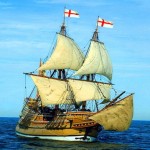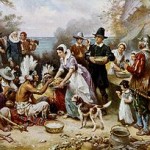pilgrimws
 Thanksgiving Day is behind us for this year, of course, but today is a day that ties into Thanksgiving in a big way. On September 16, 1620, the Mayflower left Plymouth, England on its way to the New World. I can’t begin to imagine how so many of our ancestors must have felt at that time. It was going to be a long voyage, and some of them might not make it to the end of the trip, but going was worth the risk. There were 102 passengers on the 90 foot ship. The ship was bound for Virginia, where the colonists half of whom were religious dissenters and half of whom were entrepreneurs, and all of whom had been authorized to settle in the New World by the British crown. The trip was difficult, with rough seas and storms that blew the ship 500 miles off course. When they landed, it was in Massachusetts and not Virginia that the colonists found themselves, and I guess they were not bound by the exact location, because no one was there to tell them that they had to move. So they settled there.
Thanksgiving Day is behind us for this year, of course, but today is a day that ties into Thanksgiving in a big way. On September 16, 1620, the Mayflower left Plymouth, England on its way to the New World. I can’t begin to imagine how so many of our ancestors must have felt at that time. It was going to be a long voyage, and some of them might not make it to the end of the trip, but going was worth the risk. There were 102 passengers on the 90 foot ship. The ship was bound for Virginia, where the colonists half of whom were religious dissenters and half of whom were entrepreneurs, and all of whom had been authorized to settle in the New World by the British crown. The trip was difficult, with rough seas and storms that blew the ship 500 miles off course. When they landed, it was in Massachusetts and not Virginia that the colonists found themselves, and I guess they were not bound by the exact location, because no one was there to tell them that they had to move. So they settled there.
I did not recognize anyone on the passenger list that I specifically knew to be related to me, but there were numerous sir names that I have seen in my own family history. In researching the genealogy of the people from the Mayflower however, I find that we are related to some of them because, some of the people that we know that we are related to are related to some of them. An expedition of men was sent out to scout the land, and the ship remained anchored at the tip of Cape Cod in what is now Provincetown harbor in present day Provincetown, Massachusetts. While the men were out scouting for a suitable place to build a town, Susanna White, a passenger on the ship, gave birth to her second child, a son named Peregrine. He was the first English child born in New England.
The expedition found a suitable place to settle, with cleared fields and plentiful water. They returned to the ship and the ship was moved to what is now Plymouth Harbor, arriving on December 21st. Two days later, on December 23, 1620, construction began on the settlement that was to be named Plymouth…this day 394 years ago. The first year was really difficult, with half of the people dying of disease. It was a difficult time for the colonists. It wasn’t until 1621 that the health of the people improved…as did the economic condition, with a great harvest.
To celebrate, the governor, William Bradford invited neighboring Indians to Plymouth to celebrate the bounty of the year’s harvest, in what would become the first Thanksgiving Day celebration. The people secured peace treaties with the Indians, and soon more people were attracted to the settlement of Plymouth. By the 1640s the population was over 3,000, but was nevertheless, overshadowed by the larger population of the  Massachusetts Bay Colony that was started by Puritans in 1629.
Massachusetts Bay Colony that was started by Puritans in 1629.
Nevertheless, it would be the Plymouth colony who would have the honor of hosting the first Thanksgiving, and the honor of being know as the first Pilgrims. The name pilgrim did not come into being until the early 19th century and it was from a manuscript written by Govern Bradford in which he spoke of the “saints” who traveled to the New World as “pilgrimes” in 1620. Orator Daniel Webster spoke of the “Pilgrim Fathers” at a bicentennial celebration of Plymouths founding. The name pilgrim stuck and they have been know as such in history ever since. So, while Thanksgiving is past, believe it or not, its beginning actually happened on December 23, 1620, almost a year before the actual event took place.

